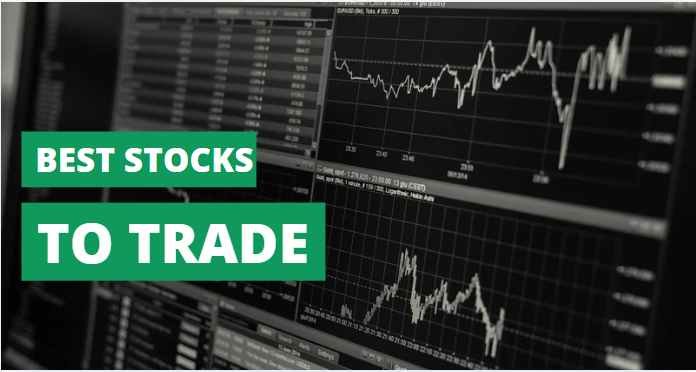
Automated Trading Systems: Revolutionizing the Financial Markets
September 4, 2024
How to trade in a declining market
September 9, 2024Top 10 Best Stocks to Trade Right Now

BEST STOCKS TO TRADE
Investing in stocks can be both exciting and profitable, but with so many options out there, how do you know which stocks are the best to trade? This guide will walk you through everything you need to know about the best stocks to trade and help you identify the best ones to trade.
Understanding Stock Trading
What is Stock Trading?
Stock trading involves buying and selling shares of companies to make a profit. The goal is to buy low and sell high, but it requires careful analysis, an understanding of the market, and often, a little bit of luck.
Different Types of Stock Trading
- Day Trading: This strategy involves buying and selling stocks within the same trading day. It requires quick decision-making and constant monitoring of the market.
- Swing Trading: Swing traders hold stocks for several days or weeks to capitalize on expected upward or downward market swings.
- Position Trading: Position traders hold stocks for longer periods, from months to even years, to benefit from long-term trends.
How to Start Trading Stocks?
Starting your journey in stock trading requires a few initial steps:
- Opening a Brokerage Account: Choose a reliable brokerage firm that offers low commissions, good customer service, and robust trading tools.
- Choosing the Right Platform: Consider factors like usability, fees, research tools, and customer support when selecting a trading platform.
Best Stocks to Trade Right Now
The market is full of opportunities, but some stocks stand out more than others due to their growth potential, stability, or unique position within their industry.
High-Growth Tech Stocks
Technology stocks are popular among traders due to their growth potential. Here are a few examples:
- Apple (AAPL): Known for its innovation and massive market share, Apple remains a favorite for many investors.
- Microsoft (MSFT): A leader in software, cloud computing, and AI, Microsoft consistently shows strong performance.
- Tesla (TSLA): As a pioneer in electric vehicles, Tesla has a high growth potential, albeit with higher volatility.
Stable Dividend-Paying Stocks
Dividend-paying stocks are great for those looking for stability and regular income.
- Johnson & Johnson (JNJ): This healthcare giant has a long history of paying steady dividends.
- Procter & Gamble (PG): A reliable choice for conservative investors, known for its diverse product range.
- Coca-Cola (KO): A blue-chip stock that offers stability and regular dividends.
Small-Cap Stocks with Potential
Small-cap stocks can offer significant growth potential, but they come with higher risks.
- Penn National Gaming (PENN): An emerging player in the gaming and online sports betting space.
- Plug Power (PLUG): A key player in the hydrogen fuel cell industry with significant growth potential.
Healthcare and Biotech Stocks
Healthcare and biotech stocks have seen a lot of action recently due to innovations and global health crises.
- Pfizer (PFE): A leader in pharmaceuticals, especially known for its COVID-19 vaccine.
- Moderna (MRNA): Gained fame for its mRNA vaccine technology, with potential beyond just COVID-19.
- Amgen (AMGN): A biotech giant with a robust pipeline of drugs and therapies.
Factors to Consider When Choosing Stocks to Trade
Choosing the best stocks to trade isn’t just about following trends; several factors should influence your decision:
Market Trends and News
Stay updated on the latest news and trends that could impact stock prices. Market sentiment can change quickly based on political events, economic reports, or even natural disasters.
Company Financial Health
Analyze the financial statements of companies to assess their profitability, debt levels, and cash flow. A company with strong financials is generally a safer bet.
Industry Performance
Consider how well an industry is performing overall. Some industries may perform better during certain economic cycles.
Technical Indicators and Analysis
Utilize technical indicators like moving averages, RSI (Relative Strength Index), and MACD (Moving Average Convergence Divergence) to identify trading opportunities.
Risks Involved in Stock Trading
Every investment carries risks, and stock trading is no different. It’s essential to understand these risks before diving in.
Market Volatility
Stock prices can fluctuate wildly due to market sentiment, economic conditions, or unexpected news.
Company-Specific Risks
Individual companies can face specific risks like management changes, lawsuits, or product recalls, which can affect their stock prices.
Economic and Political Factors
Broader economic conditions, such as inflation or interest rates, and political events can also impact stock performance.
Tips for Successful Stock Trading
To maximize your chances of success in stock trading, consider these tips:
Diversify Your Portfolio
Don’t put all your eggs in one basket. Spread your investments across different sectors and asset types to minimize risk.
Set Realistic Goals
Understand your risk tolerance and set realistic trading goals. Stock trading is not a get-rich-quick scheme.
Keep Up with Market News
Stay informed by following financial news, subscribing to stock alerts, and continually learning about the stock market.
Conclusion
Stock trading can be a rewarding venture if done wisely. From tech giants to stable dividend payers and small-cap potentials, there are numerous opportunities in today’s market. The key is to stay informed, understand the risks, and make well-researched decisions. Happy trading!
FAQs
- What is the best stock for beginners to trade?
Beginners may start with blue-chip stocks like Apple (AAPL) or Microsoft (MSFT), known for their stability. - How much money do I need to start trading stocks?
You can start with as little as $100, but it’s advisable to have a few hundred dollars to diversify your investments. - Can I trade stocks without a broker?
No, you need a brokerage account to buy and sell stocks. - How do dividends affect stock prices?
Dividends can provide steady income and may lead to a rise in stock prices if reinvested. - What are the tax implications of stock trading?
Taxes depend on your country, but generally, short-term trades may incur higher taxes than long-term trades.



